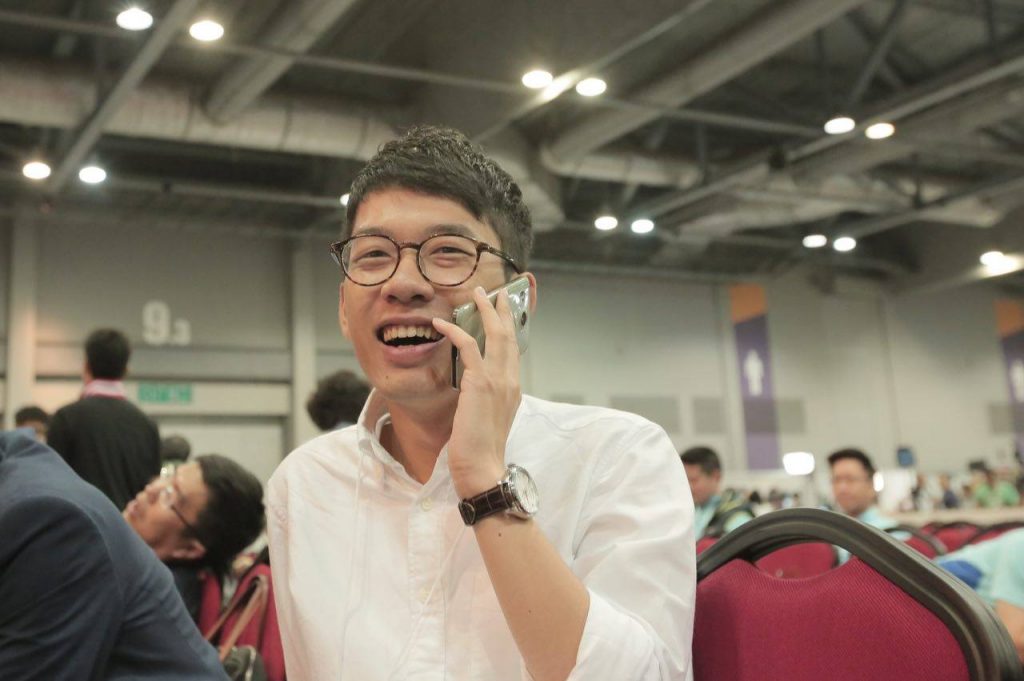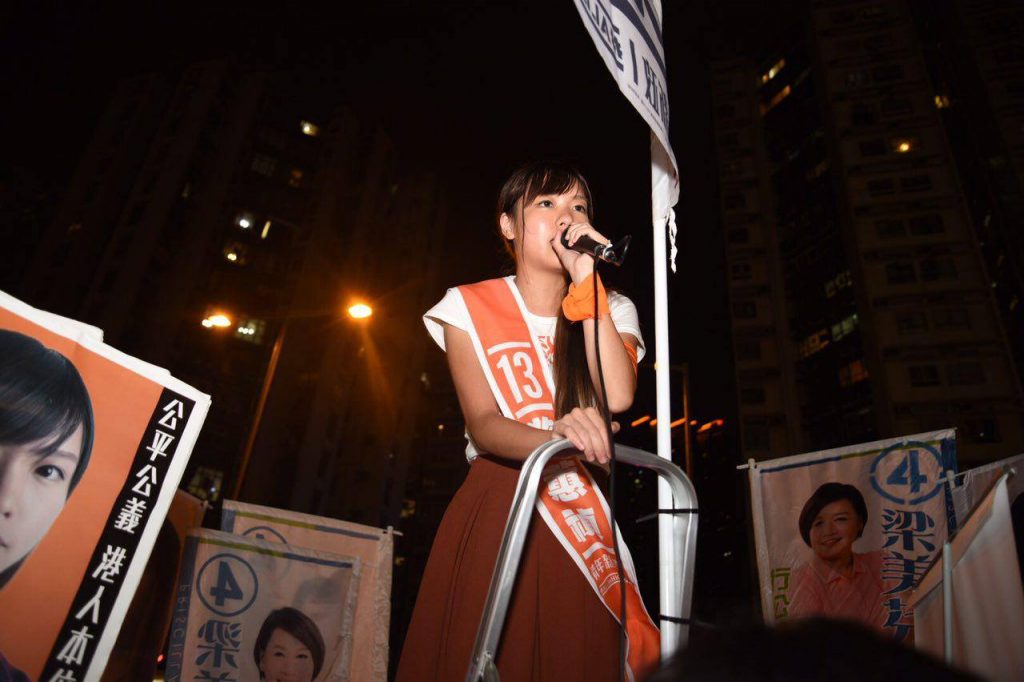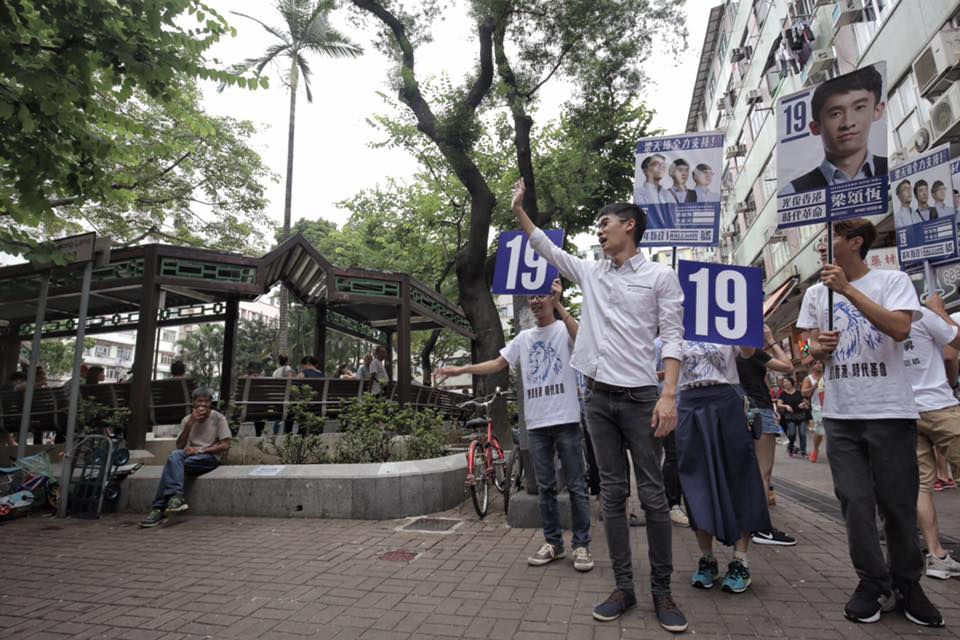by Brian Hioe
語言:
English
Photo Credit: Demosistō
THE FIRST LEGISLATIVE election in Hong Kong since the Umbrella Movement broke out in 2014 would seem to have resulted in a victory for the political opposition of pan-democratic and localist candidates, with opposition candidates winning 19 out of 35 directly elected seats in the 70 member Legislative Council, or LegCo. Pro-Beijing candidates won 16 seats. Of the opposition, three victorious candidates are from localist parties.
Notably, in Hong Kong’s electoral system, only 35 legislative seats representing districts are directly chosen by voters, with 30 seats being chosen by business groups and five “superseats” voted for by all voters—in that sense making Hong Kong questionably democratic, given that corporate bodies and business interests are literally allowed to directly vote legislators. Elected seats are referred to as “geographic constituencies” and non-elected seats chosen by business groups are referred to as “functional constituencies”. But the opposition would also win eight seats in functional constituencies and three superseats.
 Nathan Law of Demosistō after his victory. Photo credit: Demosistō
Nathan Law of Demosistō after his victory. Photo credit: Demosistō
Election results mean the opposition will continue to hold veto power to motions, bills and amendments to government bills. This requires requires 18 seats in the geographic constituencies to do. Furthermore, as some bills require a super-majority of 2/3 of LegoCo to pass, that is, 47 individuals, any political camp with 24 members would be able to block bills which require a super-majority. That the opposition possesses a total of 30 seats between the geographic constituencies, functional constituencies, and superseats means that it will be able to block such bills. Thus, with the results of elections, veto power in the legislature can continue to be used as a means for the opposition to limit the actions of the pro-Beijing camp in LegCo.
It is clear that the election was one in which the Hong Kong people were very invested in, with a record turnout of 58%—some 2.2 million voters—and with votes being cast as late as 2:30 AM due to sheer numbers, when polls were originally meant to close at 10:30 PM. Into the early morning hours, some voters were attempting to allocate their votes strategically. A reason for the large turnout is thought to be because of increased participation from young, first time voters. For obvious reasons, after the Umbrella Movement, many have been motivated to act in defense of shrinking freedoms in Hong Kong as a result of Chinese control.
Victorious legislators include 23-year-old Nathan Law of the Demosistō party which was founded after the dissolution of the Scholarism student group which played a key role in the Umbrella Movement. Nathan Law, the former chairman of the Hong Kong Federation of Students, will be Hong Kong’s youngest legislator in history. Demosistō party leader Joshua Wong, who is 19, was too young to run in elections despite efforts to push for a lowering of the age restriction on candidates.
 Yau Wai-Ching during the last hour of voting. Photo credit: Yau Wai Ching
Yau Wai-Ching during the last hour of voting. Photo credit: Yau Wai Ching
Election results also would mark the entrance of young localist candidates into legislature, including 25-year-old Yau Wai-Ching and 30-year-old Sixtus “Baggio” Leung Chun-hang of Youngspiration, Cheng Chung-tai of Civic Passion. Other fresh candidates include environmental activist and former journalist Eddie Chu Hoi-Dick and sociology professor Lau Siu-lai, who has long been a defender of the rights of hawkers and was consequently involved in the Fishball Revolution in February 2016 while selling food as a hawker. Chu won by the largest margin of any candidate, winning over 84,000 votes, while the most contested election was between Yau Wai-Ching and her opponent Wong Yuk-man, Yau winning by only 424 votes.
It may be that the victory of localist candidates leads to tension within the localist camp, however. After the banning of Hong Kong Indigenous and its candidate Edward Leung from the election, Edward Leung declared Youngspiration founder Baggio Leung to be his “substitute candidate” and was hired as campaign manager of Youngspiration. Consequently, during the election, Edward Leung campaigned on behalf of localist candidates, as the most famous youth leader of the localist camp but not being able to run himself. As an emergency measure, Baggio Leung also changed which constituency he was running in after Edward Leung’s banning as an electoral candidate, shifting to from New Territories West to New Territories East.
But what the relation of the Hong Kong Indigenous and Youngspiration will be going forward is under question. Despite a number of localist groups having banded together through the ALLinHK coalition formed by Youngspiration, Youngspiration was the only party able to get candidates into legislature. This may lead to tensions within the localist camp. There is also controversy over that Edward Leung refused to back Alvin Cheng Kam-mun, Civic Passion’s candidate in Hong Kong Island, for which he came under fire by Wong Yuk-man—Wong himself later lost to Youngspiration’s Yau Wai-Ching, despite his also being a candidate who professes to be sympathetic to localism.
 Baggio Leung campaigning on election day. Photo credit: Baggio Leung
Baggio Leung campaigning on election day. Photo credit: Baggio Leung
Apart from potential conflict with pan-Democrats as members of the political opposition, localist groups will likely also come into conflict with Demosistō, which hews a path between localist groups and the more established pan-democratic camp, going back to tension from the Umbrella Movement. Namely, the Scholarism group which predated Demosistō attempted to hew to a moderate direction during the movement and dissatisfaction with this was a factor in the rise in the rise of localism. Demosistō does not support Hong Kong independence, but calls for “self-determination”, for example, the position of Hong Kong independence being a previously unheard of political position which has gained increasing traction among localists in the years after the Umbrella Movement.
But a more fundamental question altogether may be whether localist candidates are allowed to take office altogether. This is seeing as a number of localist candidates including Leung were disqualified from participating in elections on the basis of their support for Hong Kong independence. Localist candidates who have won elections have thus far tried to remain strategically ambiguous about their support or non-support for Hong Kong independence, despite some having expressed support for this in the past. China has warned new legislators that they are not to discuss independence inside or outside of legislature.
And, indeed, if some hailed the banning of pro-independence candidates before elections as marking the death of democracy in Hong Kong, the past election was one marked by interference from China. Workers at Chinese state-owned enterprises in Hong Kong, for example, were instructed on who to vote for and told to report to their bosses after voting. Before elections, riot police drilling in the event of riots outbreaking because of contested election results may have also been a means to remind the Hong Kong people of where political power in Hong Kong truly lies—returning to Chinese political control of Hong Kong.
Elections certainly would be one way for Hong Kong people to express their views on what the relationship of what Hong Kong and China should be after the Umbrella Movement. Yet while in Taiwan, we saw a similar wave of political candidates entering legislature out of the Sunflower Movement, it remains that political power in Hong Kong ultimately is in Chinese hands. After all, as seen with the banning of pro-independence localist candidates, China has control of the rules of the game where electoral politics is concerned. This is not the case in Taiwan.
One can perhaps draw the comparisons between the rise of post-Sunflower Movement “Third Force” parties and the post-Umbrella Movement rise of localism, with the New Power Party being the only “Third Force” party that was able to enter legislature but managing to make itself known with only five members out of a 113 member legislature. Though there were not a large number of localist candidates, one imagines that they probably have the numbers to make themselves similarly felt in legislature given the smaller size of the Hong Kong LegCo as a 70 member legislature—indeed, with the rise of young politicians, sometimes it is being able to capture public attention and, in that way, occupy a disproportionate part of the discourse to their actual numbers. This may allow for future growth down the line.
This would certainly be possible with the attention currently paid to young post-Occupy candidates after elections. But as with Taiwan’s New Power Party and “Third Force,” it remains to be seen whether youth politics in Taiwan or Hong Kong are more than ephemeral phenomena and whether these groups will be able to find more stable footing to grow to become a political force in their own right—rather than flanking off of the more mainstream DPP in Taiwan or pan-Democratic political actors in Hong Kong. In this way, it remains to be seen as to what is the future of democratic politics in Hong Kong.

